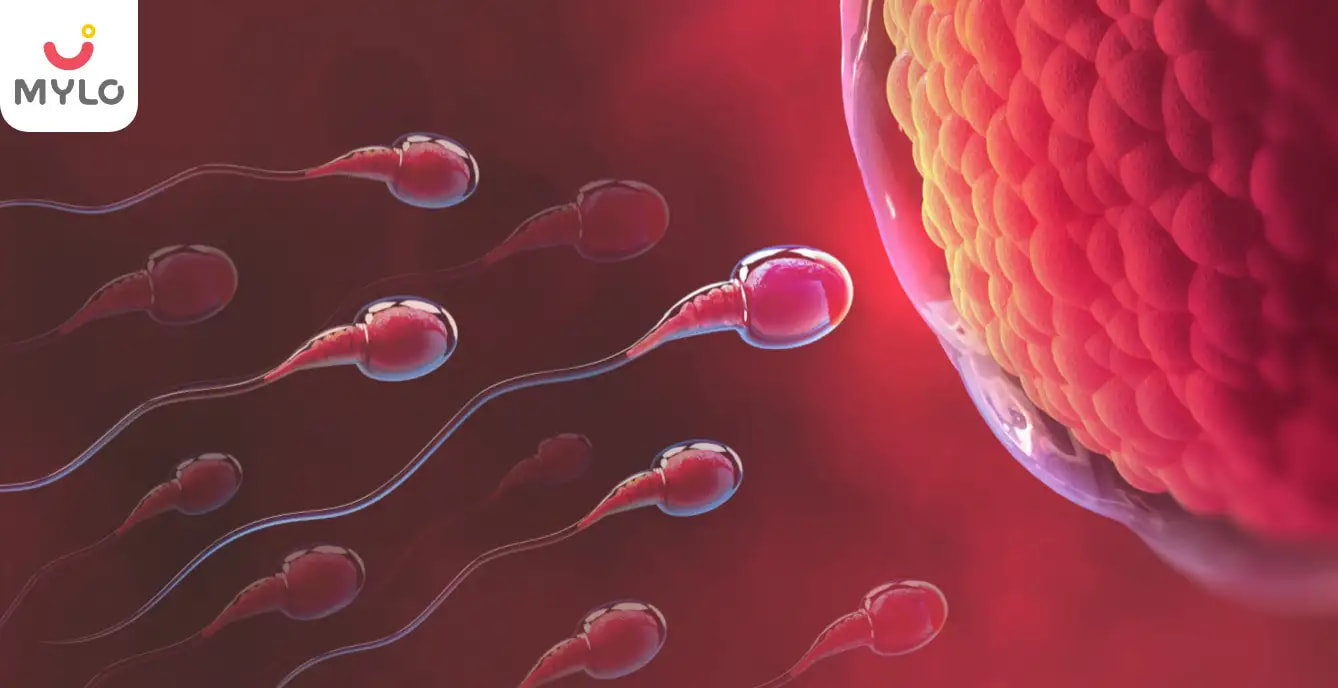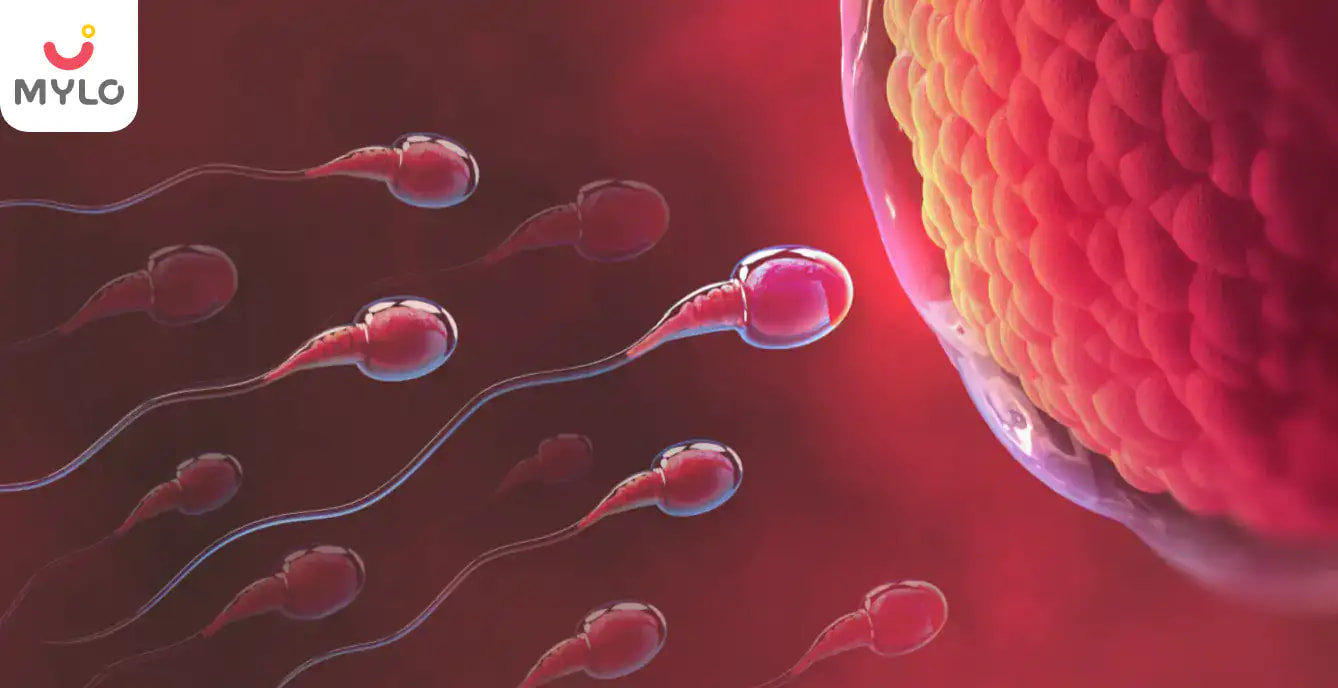Home

Conception

IUI Sperm Count: How Much Sperm is Needed for IUI?
In this Article

Conception
IUI Sperm Count: How Much Sperm is Needed for IUI?
Updated on 3 November 2023
Prabhakar: Hello Doctor, as you are aware we are planning for IUI; I wanted to know more about IUI sperm count and how much sperm is needed for IUI?
Doctor: Prabhakar That’s a good question. I have compiled all the information regarding minimum sperm count for IUI and post wash sperm count for successful IUI in a write-up. Read it thoroughly and it will clear most of your doubts regarding IUI and sperm count.
What is the Importance of Sperm Count in IUI?
Intrauterine Insemination (IUI) is a common fertility treatment that involves placing washed and prepared sperm directly into a woman's uterus to increase the chances of fertilization. One of the critical factors that significantly influences the success of IUI is the sperm count.
Several reasons highlight the importance of sperm count in IUI:
1. Fertilization Potential
A higher IUI sperm count increases the likelihood of successful fertilization, as more sperm are available to overcome the natural barriers within the female reproductive tract and reach the egg.
2. Motility and Viability
Sperm with higher counts are more likely to have better motility and viability, meaning they can move effectively and survive longer in the female reproductive system, increasing their chances of reaching the egg.
3. Count After Wash
In IUI, the semen is processed or "washed" to separate the active sperm from other components. The sperm count after this process determines the number of healthy and motile sperm available for insemination. A higher count after washing is advantageous for the success of IUI.
4. Impact on Unexplained Infertility
In cases of unexplained infertility, where no specific cause for fertility issues has been identified, a higher sperm count can improve the odds of successful conception through IUI.
5. Treatment Decision
The sperm count is an essential factor in deciding whether IUI is a suitable treatment option for a couple. In cases of severely low sperm counts, other fertility treatments like IVF (In Vitro Fertilization) or ICSI (Intracytoplasmic Sperm Injection) may be considered instead.
How Much Sperm is Needed for IUI?
The amount of sperm needed for Intrauterine Insemination (IUI) can vary depending on the specific clinic's protocols and the individual's fertility situation. Generally, the recommended minimum sperm count for IUI is around 10 to 15 million motile sperm per milliliter after the semen sample has been processed or "washed."
The washing process involves removing the seminal fluid, dead sperm, and other debris from the semen, leaving behind a concentrated sample of healthy and motile sperm. This concentrated sample is then used for the IUI procedure.Ultimately, the specific amount of sperm needed for IUI will be determined by the fertility specialist after evaluating both partners' fertility status and tailoring the treatment plan to optimize the chances of a successful pregnancy.
Minimum Sperm Count for IUI
The minimum sperm count for Intrauterine Insemination (IUI) is generally considered to be around 5 to 10 million motile sperm per milliliter after the semen sample has been processed or "washed." This count refers to the number of active and viable sperm available for the IUI procedure.
Minimum Sperm Motility for IUI
Minimum sperm motility for IUI is a critical factor that significantly impacts the success of the procedure. Sperm motility refers to the ability of sperm to move and swim actively. It is crucial for sperm to have good motility to navigate through the female reproductive tract and reach the egg for fertilization during IUI.
The minimum sperm motility required for IUI typically ranges from 40% to 50%. This means that at least 40% to 50% of the sperm in the semen sample should be moving progressively and actively.
What is Post Wash Sperm Count for Successful IUI?
The post-wash sperm count for a successful Intrauterine Insemination (IUI) typically ranges from 5 to 20 million motile sperm per milliliter. After the semen sample has undergone the washing process, the remaining sperm are concentrated and prepared for the insemination procedure.
The washing process involves separating the active and motile sperm from other components in the semen, such as seminal fluid and debris. This helps remove potentially harmful substances and increases the concentration of healthy and mobile sperm, which are essential for successful fertilization.
Know More: IUI Procedure Step by Step: A Comprehensive Guide for Couples
What Factors Affect Sperm Count and Motility?
Sperm count and motility are crucial factors in male fertility and can significantly impact a couple's chances of achieving a successful pregnancy. Several factors can influence sperm count and motility, and understanding these factors is essential in identifying potential fertility issues and optimizing reproductive health. Some of the key factors affecting sperm count and motility include:
-
As men age, sperm count and motility may decline gradually,
-
Lifestyle Factors such as smoking, excessive alcohol consumption, drug use, and poor dietary habits may negatively affect sperm count and motility.
-
Being overweight or obese
-
Medications
-
Environmental Exposures
-
Chronic Illnesses such as diabetes, kidney disease, and autoimmune disorders
-
Genetic Factors
-
Stress
Addressing and managing these factors can play a crucial role in improving sperm health and fertility.
How to Improve Sperm Count and Motility for Successful IUI?
When preparing for Intrauterine Insemination (IUI), it's essential to optimize IUI sperm count and motility to increase the chances of a successful procedure. While not all fertility issues can be resolved, there are several lifestyle changes and strategies that may improve sperm health such as:
1. Maintain a Healthy Lifestyle
Encourage the male partner to adopt a healthy lifestyle by quitting smoking, limiting alcohol consumption, avoiding recreational drugs, and maintaining a balanced diet rich in fruits, vegetables, whole grains, and lean proteins.
2. Regular Exercise
Engaging in regular physical activity can support overall health and may positively impact sperm parameters. However, avoid extreme exercise, as it might negatively affect sperm production.
3. Manage Stress
Chronic stress can disrupt hormonal balance, which may adversely affect sperm health. Encourage stress-reducing practices like mindfulness, meditation, yoga, or hobbies that promote relaxation.
4. Optimize Weight
If the male partner is overweight or obese, achieving a healthy weight through diet and exercise may positively influence sperm count and motility.
5. Avoid Overheating
Limit exposure to high temperatures, such as hot baths, saunas, or tight underwear, as excessive heat can harm sperm production and motility.
6. Supplement with Antioxidants
Antioxidant-rich supplements like vitamin C, vitamin E, zinc, and selenium may help reduce oxidative stress, which can improve sperm health.
You may also like: How Long Does it Take to Get Pregnant with an IUI Procedure (Intrauterine Insemination)?
7. Treat Infections
Address any infections in the urogenital tract promptly, as they can negatively impact sperm quality.
8. Manage Medical Conditions
If the male partner has any chronic medical conditions, work with a healthcare provider to manage them effectively, as some conditions can affect sperm health.
9. Avoid Environmental Toxins
Minimize exposure to environmental toxins, chemicals, and pollutants, which can harm sperm.
10. Abstain from Ejaculation
It's generally recommended for the male partner to abstain from ejaculation for 2-5 days before providing a sperm sample for IUI. Longer periods of abstinence may decrease sperm motility, so finding the right balance is essential.
Enhance your reproductive well-being with Mylo's carefully crafted male fertility supplements, designed to enhance sperm quality and motility. With Mylo's Potenmax testosterone booster capsules as part of your daily regimen, you can proactively foster male reproductive health and boost your overall vitality.
The Bottomline
In conclusion, IUI sperm count plays a crucial role in the success of assisted reproductive technology procedures. While a higher sperm count is generally advantageous, success rates in IUI are influenced by various factors, including sperm motility, morphology, female fertility, and overall health. It is important for couples to work closely with their fertility specialist to know how much sperm is needed for IUI, assess individual fertility factors and determine the most appropriate treatment plan.
References
1. Miller, D. C., Hollenbeck, B. K., Smith, G. D., Randolph, J. F., Christman, G. M., Smith, Y. R., Lebovic, D. I., & Ohl, D. A. (2002). Processed total motile sperm count correlates with pregnancy outcome after intrauterine insemination. Urology,
2. Muthigi, A., Jahandideh, S., Bishop, L. A., Naeemi, F. K., Shipley, S. K., O’Brien, J. E., Shin, P. R., Devine, K., & Tanrikut, C. (2021). Clarifying the relationship between total motile sperm counts and intrauterine insemination pregnancy rates. Fertility and Sterility,



Written by
Priyanka Verma
Priyanka is an experienced editor & content writer with great attention to detail. Mother to an 11-year-old, she's a ski
Read MoreGet baby's diet chart, and growth tips

Related Articles
Related Questions
Hello frnds..still no pain...doctor said head fix nhi hua hai..bt vagina me pain hai aur back pain bhi... anyone having same issues??

Kon kon c chije aisi hai jo pregnancy mei gas acidity jalan karti hain... Koi btayega plz bcz mujhe aksar khane ke baad hi samagh aata hai ki is chij se gas acidity jalan ho gyi hai. Please share your knowledge

I am 13 week pregnancy. Anyone having Storione-xt tablet. It better to have morning or night ???

Hlo to be moms....i hv a query...in my 9.5 wk i feel body joint pain like in ankle, knee, wrist, shoulder, toes....pain intensity is high...i cnt sleep....what should i do pls help....cn i cosult my doc.

Influenza and boostrix injection kisiko laga hai kya 8 month pregnancy me and q lagta hai ye plz reply me

Related Topics
RECENTLY PUBLISHED ARTICLES
our most recent articles

Diet & Nutrition
গর্ভাবস্থায় আলুবোখরা: উপকারিতা ও ঝুঁকি | Prunes During Pregnancy: Benefits & Risks in Bengali

Diet & Nutrition
গর্ভাবস্থায় হিং | ঝুঁকি, সুবিধা এবং অন্যান্য চিকিৎসা | Hing During Pregnancy | Risks, Benefits & Other Treatments in Bengali

Women Specific Issues
স্তনের উপর সাদা দাগ: লক্ষণ, কারণ এবং চিকিৎসা | White Spots on Nipple: Causes, Symptoms, and Treatments in Bengali

Diet & Nutrition
গর্ভাবস্থায় পোহা: উপকারিতা, ধরণ এবং রেসিপি | Poha During Pregnancy: Benefits, Types & Recipes in Bengali

Diet & Nutrition
গর্ভাবস্থায় মাছ: উপকারিতা এবং ঝুঁকি | Fish In Pregnancy: Benefits and Risks in Bengali

Diet & Nutrition
গর্ভাবস্থায় রেড ওয়াইন: পার্শ্ব প্রতিক্রিয়া এবং নির্দেশিকা | Red Wine During Pregnancy: Side Effects & Guidelines in Bengali
- ইনার থাই চ্যাফিং: কারণ, উপসর্গ এবং চিকিৎসা | Inner Thigh Chafing: Causes, Symptoms & Treatment in Bengali
- গর্ভাবস্থায় ব্রাউন রাইস: উপকারিতা ও সতর্কতা | Brown Rice During Pregnancy: Benefits & Precautions in Bengali
- Velamentous Cord Insertion - Precautions, Results & Safety
- Unlock the Secret to Flawless Skin: 7 Must-Have Qualities in a Face Serum
- Unlock the Secret to Radiant Skin: How Vitamin C Serum Can Transform Your Complexion
- Gender No Bar: 10 Reasons Why Everyone Needs a Body Lotion
- Unlock the Secret to Radiant Skin How to Choose the Perfect Body Lotion for Your Skin Type
- Top 10 Reasons to Apply a Body Lotion After Every Bath
- Communication in Toddlers: Milestones & Activities
- How to Improve Vocabulary for Toddlers?
- A Comprehensive Guide to Understanding Placenta Accreta
- Vulvovaginitis in Toddlers Causes, Symptoms and Treatment
- A Comprehensive Guide to Understanding Cerebral Palsy in Children
- Bitter Taste in Mouth During Pregnancy: Understanding the Causes and Remedies


AWARDS AND RECOGNITION

Mylo wins Forbes D2C Disruptor award

Mylo wins The Economic Times Promising Brands 2022
AS SEEN IN

- Mylo Care: Effective and science-backed personal care and wellness solutions for a joyful you.
- Mylo Baby: Science-backed, gentle and effective personal care & hygiene range for your little one.
- Mylo Community: Trusted and empathetic community of 10mn+ parents and experts.
Product Categories
baby carrier | baby soap | baby wipes | stretch marks cream | baby cream | baby shampoo | baby massage oil | baby hair oil | stretch marks oil | baby body wash | baby powder | baby lotion | diaper rash cream | newborn diapers | teether | baby kajal | baby diapers | cloth diapers |








